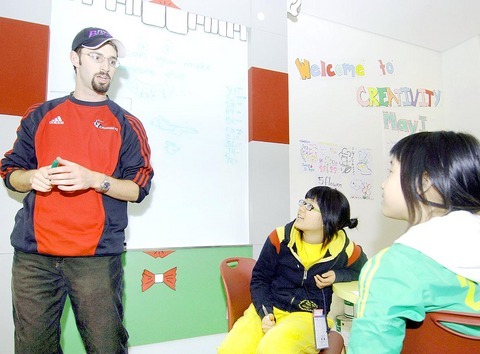Speaking Korean is not allowed at the Paju English Village, a huge English camp near Seoul, South Korea, that immerses its students in an all-English environment. But this is more than just a language camp. It is a real community made to look like an English village where hundreds of people live, eat, sleep, shop and learn.
The Paju English Village is built on a 277,000m2 piece of land, and is the world's biggest English immersion camp, boasting its own bar, bookstore, bakery, restaurant, bank, theater and even a city hall.
Electric buses drive along the main street, which branches off to classrooms and houses for 550 Korean students and 70 staff, as well as 100 teachers from various English-speaking countries. Korean is outlawed and even written signs are not allowed.

PHOTO: AFP
"We wanted to create an environment where students feel they left Korea behind," said Jeffrey Jones, head of the Paju camp.
Tens of thousands of young Koreans go abroad every year as they try to learn to speak English. In an attempt to reduce the outward flow, and to provide another choice for people who can't afford the trip, English villages are starting to appear across South Korea. Ten of these villages have already opened since 2004, and at least four more are expected to open soon.
Jones said the village allowed its Korean residents to speak in Korean only twice a day over meals, while making them speak English the rest of the time.
The Gyeonggi Province government, which owns the Paju camp, pioneered the huge immersion language program in South Korea by building the first English-only village in 2004 at a cost of 85 billion won (NT$2.88 billion). (AFP)
在南韓首爾附近的大型英語營「波州英語村」不准說韓語,讓學員沉浸在全英語的環境。不過這不只是一個語言營而已,它是一個打造成英語村的真正社區,有數百人在此居住、飲食、睡覺、購物與學習。
波州英語村佔地約二十七萬七千平方公尺,是全世界最大的英語營,以擁有酒吧、書店、麵包店、餐館、銀行、電影院,甚至市政府而感到自豪。
電動巴士沿著主要街道行駛,巷道內是教室及五百五十位南韓學生、七十位職員與一百位來自各英語系國家的教師的房舍。村內禁止使用韓語,連書寫的標語都不准。
波州英語營主任傑弗瑞.瓊斯說:「我們想創造一個讓學生將韓國拋諸腦後的環境。」
每年有好幾萬南韓年輕人出國學習英語。為了減少出國潮,提供負擔不起海外旅行的人另一個選擇,南韓各地開始出現英語村。從二○○四年開始,已有十家英語村開幕,短期內預計至少還有四家將開幕。
瓊斯表示,英語村只准許村內南韓人一天兩次用餐時說韓語,其餘時間都得說英語。
波州英語村隸屬於京畿道道廳。京畿道道廳在二○○四年斥資八百五十億韓元(新台幣二十八億八千萬元)打造了南韓首座全英語村,是南韓全英語學習計劃的先鋒。 (法新社/翻譯:賴美君)

In most cities, food waste is often regarded as one of the most troublesome types of waste: it has a high moisture content, spoils easily and produces strong odors. If not handled properly, it can cause serious sanitation and environmental problems. From the perspective of the circular economy, however, food waste is not “useless leftovers,” but rather an organic resource that has yet to be effectively utilized. The core principle of the circular economy is to break away from the linear model of “production–consumption–disposal,” allowing resources to circulate repeatedly within a system and extending their useful life. Food waste occupies a

A: Google has unveiled its 2025 Year in Search chart. No. 10 to No. 6 are: Typhoon Podul, Chinese drama “Love’s Ambition,” tariffs, US President Donald Trump and singer Khalil Fong’s death. B: Wow, actress Rosy Zhao’s new drama is so popular. So what are the top five? A: No. 5 to No. 1 are: Gemini, hanzii.net, NT$10,000 cash handout, entertainer Big S’ death and earthquakes. B: Hasn’t Trump topped this year’s most-searched people chart? A: Yup, and he’s closely followed by cheerleader GuoGuo Chiang at No. 2, whose husband Zack Fanchiang is also at No. 8. Apparently, people are curious about her extramarital

In June, headlines shocked the art world when a visitor damaged a 17th-century painting at the Uffizi Galleries in Florence, Italy, while posing for a photograph. This was not an isolated event. Recently, similar disasters have been reported worldwide, from a child damaging a Mark Rothko painting to a tourist breaking an exhibit by pretending to sit on it. Such incidents highlight why museum etiquette is increasingly crucial. First, we must recognize that art and historical objects are fragile. Once damaged, they may never regain their original condition. Many common actions, though harmless at first glance, can have grave consequences. For

A: Compared to Taiwanese, what did Americans search for most in 2025? B: No. 10 to No. 6 are: Tariffs, FIFA Club World Cup, government shutdown, DeepSeek and incoming New York mayor Zohran Mamdani. A: Mamdani is set to take office on Jan. 1. And what are the top five? B: No. 5 to No. 1 are: the One Big Beautiful Bill Act, iPhone 17, Labubu doll, animated blockbuster KPop Demon Hunters and political activist Charlie Kirk’s assasination. A: The only term to appear on both the Taiwanese and US charts is tariffs. A: 跟台灣人相比,美國人都在搜尋什麼? B: 第10到6名是:關稅、FIFA俱樂部世界盃、政府關閉、DeepSeek語言模型、候任紐約市長佐蘭曼達尼。 A: 曼達尼元旦即將就任,前5名是什麼? B: 第5到1名是:《大而美法案》、iPhone 17、拉布布玩偶、動畫片《KPop獵魔女團》、政治活動家查理柯克遇刺。 A: 看來台、美熱搜榜唯一的共同議題就是--關稅! (By Eddy Chang, Taipei